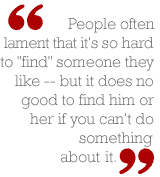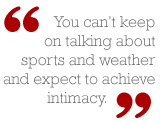|











|
Your Relating Quotient is 0 .
As with any self-report technique, your "score"
on this exercise is really your rating of yourself. Self-reports
don't "tell" you anything you did not already know, though they
can summarize it in ways that help you understand yourself better.
In this case, the lower your score out of a possible 25 points,
the lower you rate yourself on a small sample of social skills,
ranging from forgettable chitchat to the most personal of interactions.
The questions help illuminate some basic relationship skills:
Here are the skills behind your scores in the
self assessment:
1. Being able to converse
with strangers not only helps you to enjoy yourself more, it also
broadens your social circle and gives you more relationship options.
2. People often lament that it's so hard to "find" someone
they like--but it does no good to find him or her if you can't do
something about it. Most people like to be liked. Being able to
express liking, whether romantic or platonic, provides at least
an opportunity for further interactions. Nothing ventured, nothing
gained: not saying anything means you miss your chance.
3. It works both ways: it would be nice to
like everyone who liked you, but it doesn't always happen that way.
Suppose someone expresses liking for you, but you don't return
the sentiment. If you don't want to send the wrong signals, or simply
don't want to "waste your time," you need to say so -- in the same
civil but clear manner you yourself would want. No one likes to
hear bad news, but early in an acquaintanceship the news of "no
interest" isn't really that bad -- and telling the truth (nicely)
means you don't have to remember what you said. In other words,
if what you mean is "Sorry, I'm not interested at all," say so,
don't say, "I'm really busy next weekend . . . and the next . . ."
4. What two people do in a relationship -- any
relationship -- is communicate. In some relationships, communication
only gets so close, and stops there. But in close relationships,
talk and action move from superficial to personal levels. You can't
keep on talking about sports and weather and expect to achieve intimacy.
As you do disclose more personally to each other, you'll find it
easy and enjoyable to share the best of yourself. But the good stuff
isn't the whole story. Be prepared to share "the bad and the ugly"
as well. And be prepared to hear it in return, and to show you are
accepting and trustworthy.
5. In fact, only half of "communicating" is
talking; the other half is listening. Even if you're not
a great talker, you too can find companionship if you start by listening.
This requires not only an open ear and a willingness not to interrupt,
but the body language and eye contact that show interest and empathy.
Listening well is not easy. Many people who describe themselves
as "lonely" wrongly assume that the key to social success will lie
in reciting icebreakers or pickup lines. In fact, even by wordlessly
indicating your interest, and asking questions that show it, you'll
make a better impression and a more genuine interaction.
Why Relationships Matter
In the simple company of others, we find information
and reassurance. Friends provide us with assistance and support, someone
to bail us out or provide a listening ear. Romantic love is celebrated
in movies and CDs as it has been in song and story since the 12th
century -- new in human history, perhaps, but pervasive now in its
influence. Studies confirm that married people actually are healthier
and happier than those without committed partners. Look around you,
look at your own life and tick off the many ways other people can
offer you what you need.
Or on the other hand, consider the "bad examples," instances of what
happens when people do not get adequate social or intimate contact.
Infants who are not cuddled, physically touched and held will fail
to thrive or even to survive. Prisoners in solitary confinement may
become disordered, increasingly unable to deal with social contact.
The self-exiled hermit Ted Kaczynski hides in his shack in the Montana
woods, types out his paranoid fantasies and launches attacks on total
strangers, earning his terrible fame as the Unabomber. People who
live without relationships often fail to be fully human or even to
function in human society. When neighbors describe a criminal suspect
as a stereotypical "loner," that simple clich? is a condemnation.
But being without just the simplest relationship skills may make an
individual feel maladjusted, self-defeating and unhappy.
The above exercise should help you see that different
skills are needed for different degrees of social closeness. Some
relationships are superficial, others are deep; the different degrees
of closeness require different types and depths of skill. Once you
have become close to someone, for example, the quality of your party
conversation shouldn't matter as much. A wide variety of skills -- in
talking, listening and expressing -- will be useful in a broad spectrum
of relationships. But becoming good at any one type of interaction
won't guarantee success in others. And relational "disabilities" can
certainly block opportunities, prevent intimacy and produce loneliness.
In an affluent culture, it's easy for people to isolate and insulate
themselves. The gap between you and someone else can become a gulf
if you aren't ready, willing and able to take action, and make contact.
The more we hesitate, the harder it gets. For some people, this hesitation
is a way of life, a pattern we call shyness, a topic we will cover in a later session.

The psychology of close relationships is a growing
discipline, based on observations of real partners' interactions,
on people's responses to interviews and surveys, records and archives,
and experiments that examine smaller parts of the larger relating
process. Most college-level courses are offered in departments of
psychology at the university level, but many are also developed under
the heading of sociology, counseling, communication or family studies.
And a few secondary schools have recognized how supremely useful it
would be if teenagers knew a thing or two about intimacy beyond its
personal appeal.
This seminar series from TheDoctorWillSeeYouNow presents information to help you with some of the central issues in people's relationship experiences and motives.
Meet Your Virtual Instructor
Actually, I am not virtual at all! I am Ann Weber
and I am a Professor of Psychology at the University of North Carolina
at Asheville, in the mountains of Western North Carolina. I've been
teaching classroom-based courses on the Psychology of Close Relationships
since 1982, one of the longest continuous offerings of the course
in the nation. I earned my doctorate in social psychology from The
Johns Hopkins University in 1978, and have been teaching at UNCA ever since.
On my own and with distinguished colleagues, I've written and
co-authored numerous books, chapters and articles in psychology, on
topics ranging from grief and bereavement to relationship "thinking."
I'm an active member of both the International Network on Personal
Relationships (INPR) and the International Society for the Study of
Personal Relationships (ISSPR), the latter having awarded me its second-ever
Outstanding Teaching Award. In sum, I'm an experienced teacher and
writer on the subject of the psychology of close relationships. My
UNCA course on the subject is quickly enrolled, successful -- and
enjoyable. It's time for me to venture outside the classroom and into
cyberspace.

|



